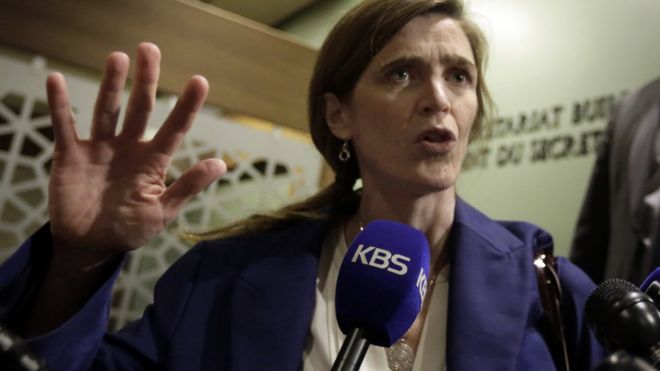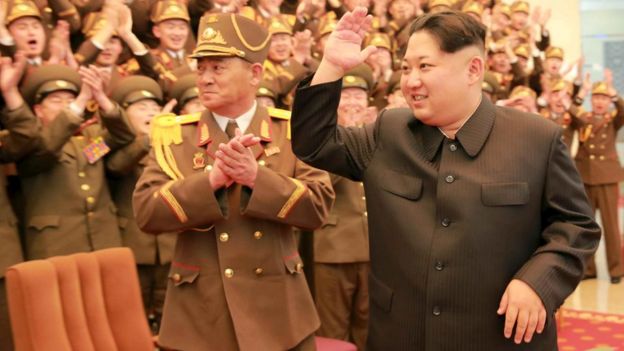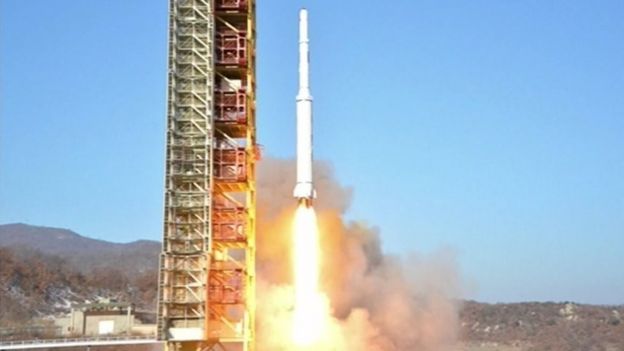 AP
AP
The US, backed by China, has submitted a draft resolution to the UN Security Council aimed at imposing tougher sanctions on North Korea.
It comes in response to North Korea's recent nuclear test and missile launch.
The measures would for the first time require UN member states to inspect all cargo to or from North Korea.
The US ambassador to the UN, Samantha Power, said it would be the strongest set of sanctions imposed by the Security Council in more than 20 years.
A vote is expected at the weekend.
North Korea's launch of a long-range rocket in February and a nuclear test in January were widely condemned as a flagrant violation of UN resolutions.
 Reuters
ReutersWhat are the proposed sanctions?
- UN member states would inspect all cargo to or from North Korea
- North Korean ships suspected of carrying illegal goods would be barred from ports worldwide
- An arms embargo would be widened to include supplies of small arms
- The supply of aviation fuel including rocket fuel to North Korea would be banned
China also condemned North Korea's actions but it has previously been reluctant to endorse sanctions that could threaten its neighbour's stability.
"For the first time in history, all cargo going in and out of the DPRK (North Korea) would be subjected to mandatory inspection," Ms Power said after presenting the draft resolution measure to the Security Council.
"These sanctions, if adopted, would send an unambiguous and unyielding message to the DPRK regime. The world will not accept your proliferation. There will be consequences for your actions."
 Reuters
ReutersAnalysis: Stephen Evans, BBC News, Seoul - 'Punishing a masochist'
Ninety per cent of North Korea's trade is with China but the proposed sanctions do not prohibit that trade.
They might make it harder to do business if inspections of North Korean ships became bureaucratic and burdensome, but as it ordered the cargo China already knows the contents of coal ships from North Korea.
Where sanctions might bite is with aviation fuel. An effective block on fuel for Air Koryo would dent the tourist trade - and 30,000 Chinese tourists visit North Korea every year (though Air China also flies into Pyongyang).
There is a bigger question and that is whether sanctions are the best way of bringing change. One American professor in a Korean university said sanctions were like "punishing a masochist".
China may be more on board with the US now because it can see that North Korean progress towards deliverable nuclear weapons is relentless, and it might think that the US ultimately will simply not tolerate this. On this reading, the argument in Beijing may be: "we'd better stop them now before the US does it later".
On top of that, the Americans are talking about installing a sophisticated anti-missile shield in South Korea. This would see far into Chinese airspace. There may be some negotiation going on where Washington promises Beijing to hold fire on the radar system in return for serious Chinese pressure on Pyongyang.
Thursday's announcement followed weeks of negotiations between the US and China that culminated in talks in Washington this week between US Secretary of State John Kerry and Chinese Foreign Minister Wang Yi.
The North insists its missile programme is purely scientific in nature, but the US, South Korea and even its ally China say such rocket launches are aimed at developing inter-continental ballistic missiles.
The North's nuclear test in January, which it claimed was a test of hydrogen bomb technology, was its fourth since 2006.
No comments:
Post a Comment